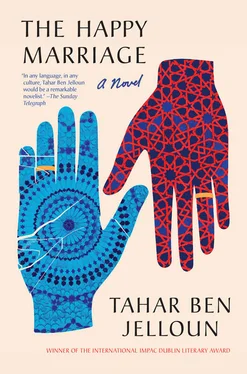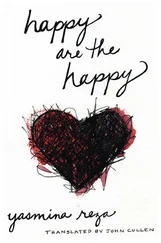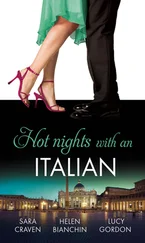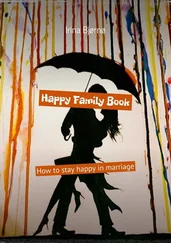Cruelty between a man and a woman is essential.
— Matsuko, the killer’s wife
NAGISA OSHIMA, Violence at Noon
The painter was surprised to see that his wife had changed her habits since they’d moved to Casablanca. She was often out of the house, and would only come back in the middle of the night. She drank quite heavily and always said that she’d been “out with the girls!” She spent time with a group of embittered, divorced women who’d embraced feminism late in life, who met at the house of a witch whose ugliness betrayed her dark soul. She was short, chubby, had a mane of hair that made her look like a lioness, sharp beady eyes, and a narrow forehead that, according to a physiognomist, was a bad omen. She called herself Lalla, claiming that her mother had been one of Hassan II’s concubines. All Moroccan princesses used the honorific of “Lalla” before their names. She talked a lot of nonsense, claimed that she’d once been a hippie who’d slept with celebrities, musicians, singers, and even a famous actor, whose photo she carried with her, saying it had been taken outside a villa in Los Angeles even though the décor clearly indicated it had been taken in the Casbah of Zagora. She said she’d spent some time in India under the tutelage of a guru who’d opened her eyes to the mysteries of the soul; thanks to him, she’d discovered the source of all energies, both positive and negative. She would claim that the waves of energy we send out are slow to reach their destination, adding that she’d only just received those emitted by her mother who’d been buried ten years earlier. In a nutshell, she played the part of a mystic with complicated words whose exact meaning eluded her, but which she voiced confidently enough to influence minds that were ready to follow her, people who would obey her deliriums and submit to her manipulations. She basically rehashed old feminist discourses from the 1960s and spliced them with her own unique brand of Eastern-mystical-mythological hocus-pocus, serving it up with a great deal of mass-market, Made in China incense fumes that she purchased in the drugstores of the El Maârif neighborhood in Casablanca. She would pretend that her Indian guru had sent her herbs that he’d picked from his own garden and that he’d laid to dry in his meditation room. She would feed them names of people she’d picked out from the pirated DVDs of Bollywood films that were sold close to the Joutia vegetable market on Derb Ghallef.
Lalla had a sense of theatrics and a knack for showmanship. Everything about her was an illusion or a trick, but she still pulled it off, despite the obvious stupidity and absurdity of the things she said. The bigger the lie, the less her entourage of groupies suspected her of deceiving them. In her, those women had finally found a soul mate who understood them and who knew how to find the right words to speak to them and show them the way. Lalla had married a cousin of hers who’d inherited a great deal of money. Her cousin was gay and their marriage had been a means for him to keep up appearances, and he’d paid dearly for that. After a year of so-called married life, she’d separated from him after having extracted a few million dirhams from him, as well as the villa where they’d lived. Without any money worries, she’d had enough time and funds to surround herself with a retinue in order to make herself feel important. She claimed that she translated books for American publishing houses, but she’d never been able to show anyone so much as a single book that bore her name on the cover. Her father, who’d remarried after the death of his first wife, lived far away from her and hardly ever saw her. Lalla had tried to lure her stepmother into her circle, but the latter had quickly seen through her bluff and told her a few home truths. A few days later, Lalla had brought her father some compromising photos of his new wife that she’d digitally altered on her computer. She’d wanted to damage her stepmother’s standing, but the latter had proved stronger and smarter, and she’d disproved the hoax. After Lalla’s pathetic plot had failed, she’d been ostracized by her family and forbidden to set foot in her father’s house. Nevertheless, Lalla had told her “girls” that her father had been bewitched by a sorceress who was robbing him blind of all his property and from whom she hoped she could one day save him. The painter’s wife had taken that surreal story seriously. She claimed that the stepmother hailed from a family in Agadir and was descended from a long line of Southern sorceresses. Whenever her husband had expressed some doubts, she had flown into a rage and screamed because he’d dared to question Lalla’s words.
For a while, the painter had suspected that his wife’s relationship with Lalla could be a cover for a lesbian affair. He knew, of course, that his wife hated homosexuality, and that she couldn’t stand women who got too close to her in order to seduce her. However, she was so enthralled by Lalla that he couldn’t help but wonder. She would sometimes spend the whole day with her. She must have had some feelings for her because she swore only by her and repeated what she’d said word for word, reeling off her speeches forcefully and determinedly, emphasizing each sentence as though she were holding forth in court. The painter had tried to reason with his wife, tried to show her that Lalla was a bored, overexcited woman who needed to surround herself with an entourage to make herself feel alive, but it had all been in vain. His wife defended Lalla and wouldn’t tolerate the slightest criticism. It was normal for a husband to be jealous of a woman who took up all of his wife’s time, sometimes even twelve hours a day. He’d believed she would be receptive to this line of argument since she could interpret it as proof of his love. Perhaps she wouldn’t break off her ties to Lalla, but it would at least induce her to have a greater awareness of that manipulator’s emotional and mental state.
But no. Instead, she told him: “Finally someone opened my eyes. Lalla is the worthiest, noblest, and most honest woman in this city. She’s a talented artist. It’s thanks to her that I finally realized that I sacrificed my own life; from now on, I refuse to let anything upset me, I won’t put up with any more humiliations from your family, or the tricks your brother and his good wife are fond of pulling, or the schemes of your sisters, who only come to see us so they can wheedle money out of us. I’m a free woman, I can do what I want. I’m going to fulfill myself. I’m going to find a way to live that doesn’t involve being under the heel of a perverse, selfish monster, a coward, a husband who still acts like he’s a bachelor, a hypocrite who doesn’t realize he’s brought children into this world. Yes, thanks to Lalla, my eyes have been opened and I’m finally going to start living my own life, and as for you, you can go fuck yourself, you and your floozies who dance around you and your filthy money … I sent your sister packing the other day, telling her you were traveling in Asia. She believed me and went home. She was very disappointed. I told her that it wasn’t worth her while to travel all the way from Marrakech because you’ve gone bankrupt and we don’t have any money. I think she even started to cry!”
She’d made her case, and now it was up to him to draw his conclusions. Some of his friends volunteered to talk to the painter’s wife, especially since they knew of the witch’s reputation. But his wife had the ability to make people believe that she hadn’t only listened closely to them, but also agreed with them. So his friends had come away pleased with how their interventions had gone and had left feeling appeased. That’s because they didn’t know her well. His wife’s defense mechanism was simple and yet astonishingly effective. She always did as she pleased and was happily oblivious to what people thought of her.
Читать дальше












